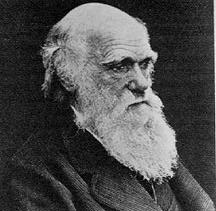


 |
 |
Darwin, Charles (1809-1882) |
 |
 English naturalist who was the grandson of Erasmus Darwin and father of physicist George Darwin. Darwin did poorly in school, and so could not secure employment following his graduation from divinity school. However, he was able to secure a position as ship's naturalist aboard the H. M.S. Beagle. The Beagle undertook a five year cruise around the world, beginning December 27, 1831 and ending October 2, 1836. During the course of the voyage, Darwin noticed how species changed along the coast of South America, and especially on the Galápagos Islands. Upon returning to England, he published his observations in A Naturalist's Voyage on the Beagle (1839). Darwin, reflecting on his observation, developed a theory of evolution. According to this theory, individual variability means that some organisms have a slight advantage over others. The advantage will allow the organisms to compete better in the "struggle for existence" and produced more offspring, which will inherit the advantageous qualities. The process whereby favorable traits in the most "fit" animals allow it to survive and reproduce, Darwin called "natural selection." He included the idea of "sexual selection" in his theory, stating that the struggle for possession of females will lead the most vigorous males producing the most progeny.
Darwin was probably influenced in his formulation of evolution by the Uniformitarian views expressed in
Lyell's Principles of Geology, which Darwin had brought on board the Beagle. However,
Darwin put off publishing because he knew the theory would arouse great controversy. Therefore, he continued to compile
evidence until he received a letter from
Wallace in 1858 along with a memoir on Wallace's own theory of evolution
through natural selection. This spurred Darwin to publish his theory of natural selection in On the Origin of
Species by Means of Natural Selection, or the Preservation of Favoured Races in the Struggle for Life (1859), often
abbreviated The Origin of Species. This book revolutionized biology, and is one of the most revolutionary ever
published. Darwin further entangled himself in controversy with the publishing of The Descent of Man (1871), in
which he specifically addressed the evolution of the human species.
Barrett, P. H. et al. Charles Darwin's Notebooks, 1836-18444: Geology, Transmutation of Species, Metaphysical Enquiries. Ithaca, NY: Cornell University Press. Bowler, P. J. Charles Darwin: The Man and His Influence. New York: Cambridge University Press, 1996. Darwin, C. The Origin of Species by Means of Natural Selection. Milner, R. The Encyclopedia of Evolution: Humanity's Search for Its Origins. New York: Holt, 1993.
© 1996-2006 Eric W. Weisstein
|
||